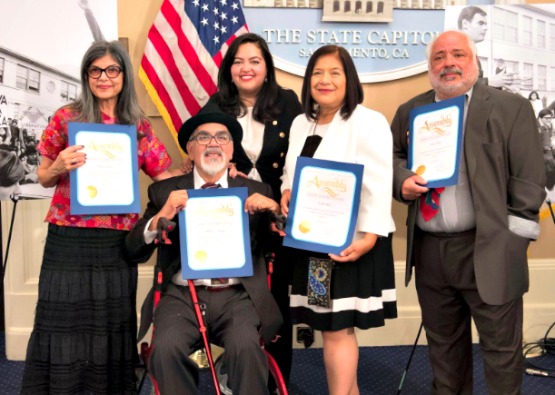This month has been busy for the alumni of the East LA Walkouts, also referred to as the Chicano Walkouts or Chicano Blowouts. It has been 50 years since young people from the eastside of Los Angeles walked out of their classrooms and took to the streets to demand a better education, that their history be taught in the schools, and to protest the war in Vietnam. There will probably not be another time when so much focus is on this particular cohort of Chicano elders. It’s heartening to see so many events recognizing the students who were involved in these protests, considering the obstacles that they had to overcome.
On Monday, Assembly member Wendy Carrillo, who represents the 51st Assembly district, which includes much of the eastside, honored four of the walkout participants, Bobby Verdugo, Yoli Rios, John Ortiz, and Mita Cuaron, in Sacramento. Yoli Rios and Bobby Verdugo attended Lincoln High School, and John Ortiz and Mita Cuaron attended Garfield High School.
In a statement, Assembly member Carrillo said, “The Chicano Walkouts were a breakthrough moment for the Latino community. By commemorating the courageous organizing of Chicano students, we not only honor their sacrifices, but remind ourselves of the power of our community to create lasting change. The history of the walkouts is especially resonant today as students across the country walked out last week and are preparing this week for the ‘March For Our Lives.’ I was proud to introduce Bobby, Yoli, John and Mita to the Assembly as they truly are living mentors for the students of today.”
Verdugo, Rios, Ortiz, and Cuaron also attended a reception that was co-sponsored by the California Latino Legislative Caucus Foundation. Legislators and staffers were able to converse and get to know the walkout leaders during that reception.
“I’m glad that we have been able to share our experiences with the walkouts and engage with others, especially young people who are taking the lead today. There are definite parallels with some of the student movements today like gun safety. While we weren’t being shot at school, we also dealt with issues like violence, the quality of schools, and the ability to learn our own history — and basically to have our humanity recognized. We were fighting for multiple issues,” Verdugo said.
Mita Cuaron shared that some of the things that she and her classmates were demanding included smaller classrooms, ethnic studies, culturally sensitive teachers, and more of a focus on their culture given that East LA was and still is predominantly Mexican-American.
“Chicano studies needs to be put into the curriculum from K-12 to bring attention to young students that they can learn about people who come from their community, that they can read books with people who talk like them and have the same culture as them. This is important so that children know that they have history and mentors to look up to,” Cuaron shared. She also expressed disappointment in how the Mexican American studies curriculum has been targeted in Arizona.
John Ortiz shared that he has always tried to impart elements of Mexican and Mexican American history in his own work as a teacher.
Verdugo, Rios, Ortiz, and Cuaron feel that they were able to make progress in advancing more awareness about their history and making some gains in the schools, but they all acknowledge that so much more needs to be done.
Adriana Maestas
She has worked in the non-profit sector, in the K-12 system, and in higher education in various capacities. When she's not writing stories or working on media projects, Adriana trains instructors to teach online at the University of California, Irvine.
She holds a bachelor’s degree in political science from the University of California, Irvine and a master’s degree in public policy from Claremont Graduate University.
Latest posts by Adriana Maestas (see all)
- The Coronavirus Pandemic Poses Unique Problems for Latinx Communities - March 24, 2020
- 25 Chicas de Preparatoria se Graduan Del Instituto de Verano para Negocios y Liderazgo en Los Ángeles - July 24, 2019
- 25 High School Girls Graduate From Summer Institute for Business and Leadership in Los Angeles - July 22, 2019
- Margeaux Randolph Ofrece Educación Técnica a Estudiantes en el Sur de Los Ángeles - April 4, 2019
- Margeaux Randolph Brings Tech Education to Students in South LA - March 29, 2019

